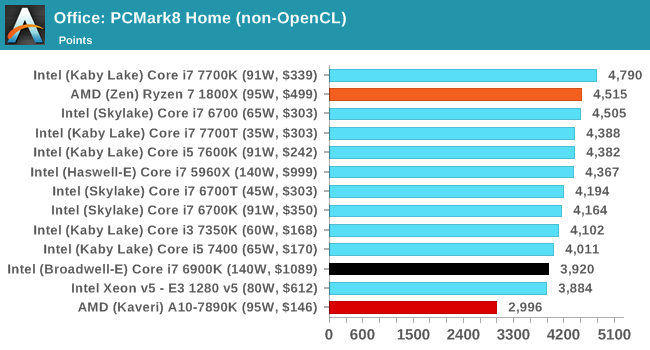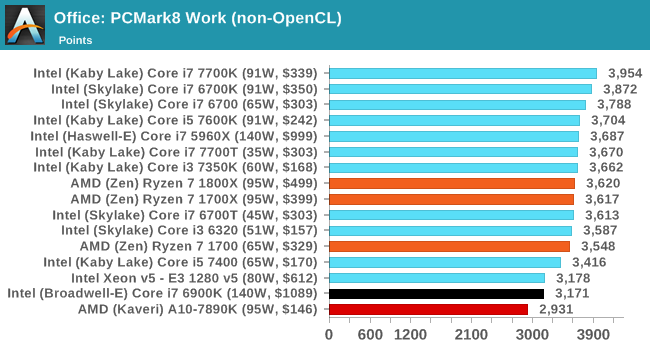The AMD Zen and Ryzen 7 Review: A Deep Dive on 1800X, 1700X and 1700
by Ian Cutress on March 2, 2017 9:00 AM ESTBenchmarking Performance: CPU Office Tests
The office programs we use for benchmarking aren't specific programs per-se, but industry standard tests that hold weight with professionals. The goal of these tests is to use an array of software and techniques that a typical office user might encounter, such as video conferencing, document editing, architectural modelling, and so on and so forth. At present we have two such tools to use.
PCMark8
Despite originally coming out in 2008/2009, Futuremark has maintained PCMark8 to remain relevant in 2017. On the scale of complicated tasks, PCMark focuses more on the low-to-mid range of professional workloads, making it a good indicator for what people consider 'office' work. We run the benchmark from the commandline in 'conventional' mode, meaning C++ over OpenCL, to remove the graphics card from the equation and focus purely on the CPU. PCMark8 offers Home, Work and Creative workloads, with some software tests shared and others unique to each benchmark set. The Creative workload unfortunately seems to fail from the commandline, as the graphical test gives an output of zero (update 3/8: we've found a way around this; will update when we get CPUs retested).


Addendum on 3/8: Originally we posted PCM8 Home scores for Ryzen that were around 3800. On further inspection, these runs were misconfigured due to circumstances beyond our control, and test data is being re-run. The Ryzen 7 1800X in this instance scores 4515.
SYSmark 2014
SYSmark is developed by Bapco, a consortium of industry CPU companies. The goal of SYSmark is to take stripped down versions of popular software, such as Photoshop and Onenote, and measure how long it takes to process certain tasks within that software. The end result is a score for each of the three segments (Office, Media, Data) as well as an overall score. Here a reference system (Core i3-4130, 4GB DRAM, 500GB HDD) is used to provide a baseline score of 1000. A newer version of the benchmark (2014 SE) will be used in future reviews.
A note on contect for these numbers. AMD left Bapco in the last two years, due to differences of opinion on how the benchmarking suites were angled towards Intel processors and had optimizations to show bigger differences than what AMD felt was present. The following benchmarks are provided as data, but the conflict of opinion between the two companies on the validity of the benchmark is provided as context for the following numbers.














574 Comments
View All Comments
zangheiv - Thursday, March 2, 2017 - link
Hard to believe how a company like intel that repeatedly and knowingly engaged in illegal acts and other tactics to monopolize the market and cheat the consumers into high-prices, can still have dumb happy consumers after Ryzenlmcd - Thursday, March 2, 2017 - link
Some people like 256-bit vector ops I guess :-/ who would've guessed?Ratman6161 - Thursday, March 2, 2017 - link
Have to agree. To me, the i7-7700K seems like the better bargain right now. Then again, I'm looking at a $329 I7-6700K motherboard and CPU bundle and the 7700K isn't really all that much of an upgrade from the 6700K. But in the final analysis, after all this reading, I'm still not seeing anything that makes me want to rush out and replace my trusty old i7-2600K.Meteor2 - Friday, March 3, 2017 - link
+1. Maybe, as Rarson says above, a 4C/8T Zen might clock fast enough to challenge the 7700K. But in the workloads run at home, the 1800X does not challenge the (cheaper) 7700K.HPC and data centre are completely different and here Zen looks like it has real promise.
Meteor2 - Friday, March 3, 2017 - link
...Sadly the R5s are clocked equally low.https://www.google.co.uk/amp/wccftech.com/amd-ryze...
Limited by process, I guess.
Cooe - Sunday, February 28, 2021 - link
Again. You're an absolute idiot for thinking that the only "workloads done at home" are 1080p gaming & browsing the web.... You are so out of touch with the desktop PC market, it's almost unbelievable. Here's hoping you were able to aquire some common sense over the past 4 years.cmdrdredd - Saturday, March 4, 2017 - link
" I'm still not seeing anything that makes me want to rush out and replace my trusty old i7-2600K."I agree with you. I have an overclocked 3570k and I don't see anything that makes me feel like it's too old. I'm mostly gaming on my system when I use it heavily, otherwise it's just general internet putzing around
Jimster480 - Thursday, March 2, 2017 - link
Sorry but this is not the case.This is competing against Intel's HEDT line and not against the 7700k.
2011v3 offers more PCI-E lanes only if you buy the top end CPU (which ofc isn't noted in most places) a cheaper chip like the 5820k for example only offers like 24 lanes TOTAL. Meaning that in price comparison there is no actual comparison.
Ratman6161 - Thursday, March 2, 2017 - link
Well, whomever is trying to compete against, I7-7700K is about the top of the price range I am willing to spend. So Intel's 2011V3 lineup isn't in the cards for me either. AMD really isn't offering anything much for the mid range or regular desktop user either. In web browsing, office tasks, etc, their $499 CPU is often beaten by an i3. Now, the i3 is just as good as an i7-6900K too and in at least one test the i3 7350K is top of the charts. Why does this matter? Well, where does AMD go from here? If the i3 out performs the 1800x for office tasks, what will happen when they cut it to 4 cores to make a cheaper variant? Seems like they are set up for very expensive CPU's and for CPU's they have to sell for next to nothing. Where will their mid range come from?silverblue - Thursday, March 2, 2017 - link
Something tells me that if I decide to work on something complicated in Excel, that i3 isn't going to come anywhere near an R7. Besides, the 4- and 6-core variants may end up clocked higher, we don't know for sure yet.